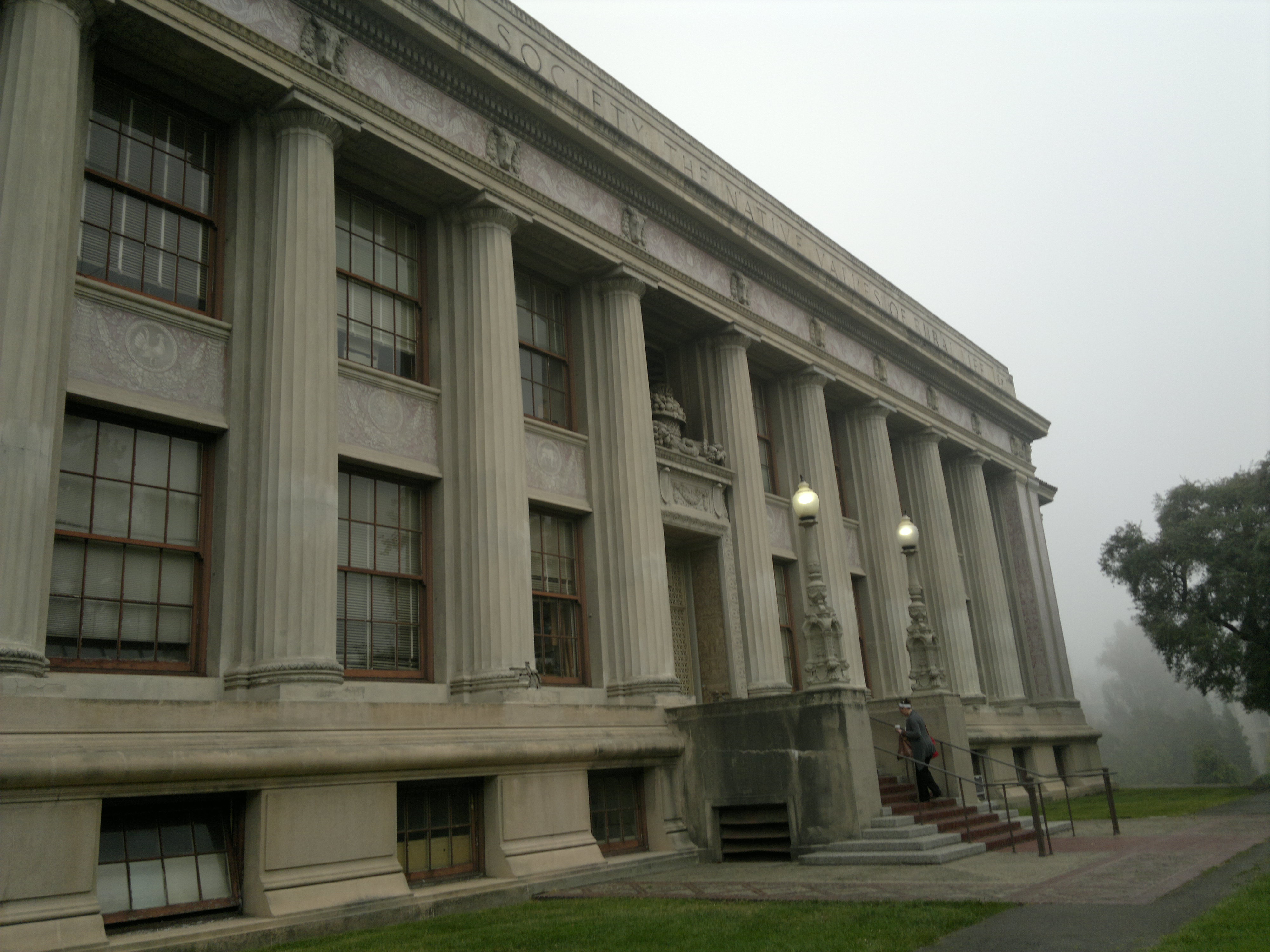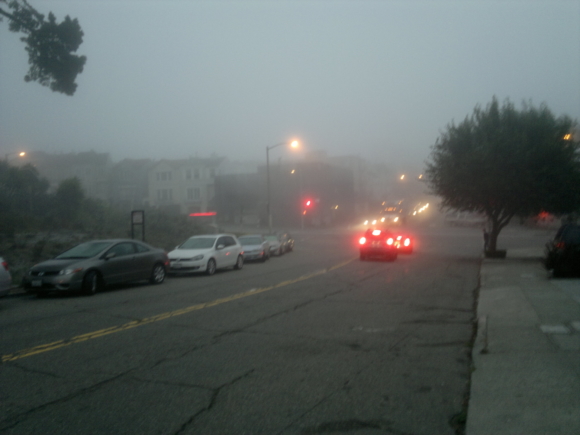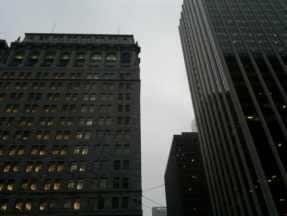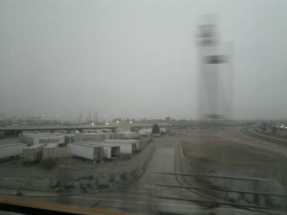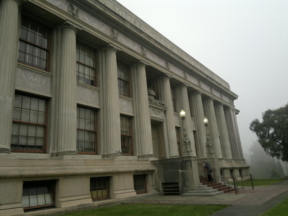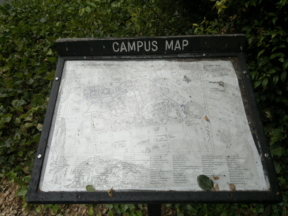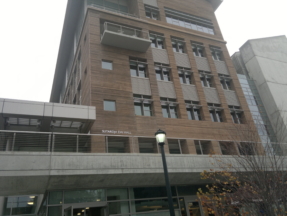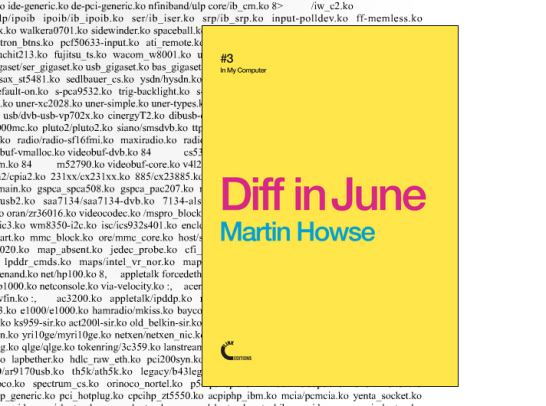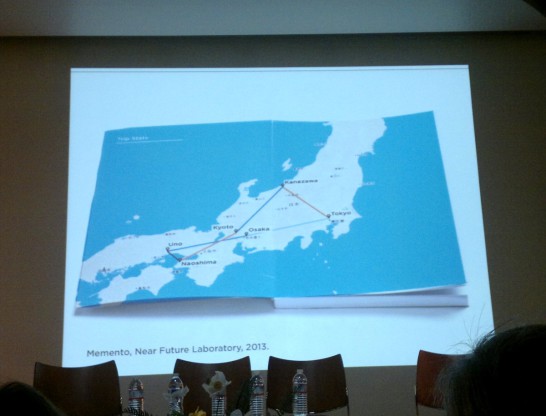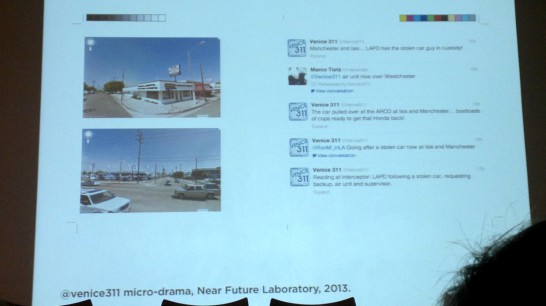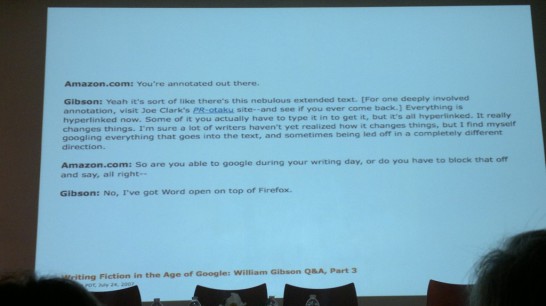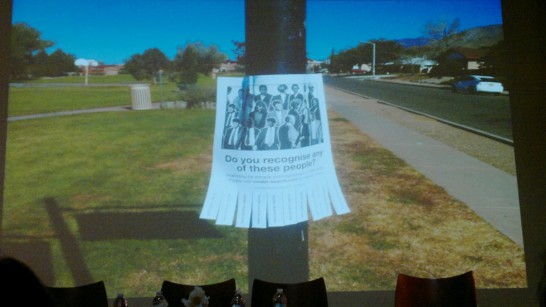Here are live conference notes taken Wednesday October 23rd during the Creating Minds 2013 conference at Berkeley center of new media, in the frame of the Futures of the Book series of events. See an index of my live notes here.
Usual live blogging disclaimer (looted from Dave Crossland):
These are informal notes taken by me, Manuel Schmalstieg, at the event, and may or may not be similar to what was said by the people who spoke on these topics. Probably if something here is incorrect it is because I mistyped it or misunderstood, and if anyone wants corrections, they should email me – or post a comment. Thanks!
TOC:
- Session 1: François Bon
- Session 2: From aristoteles to zeitgeist
- Session 3: Nicolas Nova
- Session 4: James Bridle, “Network Tense”
Intro: some pics from the travel to Berkeley:
Session 1: François Bon
intro:
developed his own epublishing platform.
mainly works now at experimental/creative writing.
enters stage with his iPad
in 1982, i published my first book
becket, robbe-grillet,
my first refrigerator
1983
manual typewriter > electric case, IBM
“i can go back over the last 15 characters!!”
still carbon paper to make copy, scissors to format.
1988: first computer, Atari
most friends have Mac classic, Amstrad…
Matrix printer, perforated paper, lots of noise….
1990: we agree on a new manuscript with Jerome … from ed. minuit
“I hate macintosh literature”
“send me your disk anyway”
digital publishing has arrived in france.
traditional publishing system:
july: printed
august: sent to critic’s vacation adress
september: goes into book shops
goncourt price….
i’m translated, in netherlands, germany. china too.
negotiated: 500 $.
same book everywhere.
1992.
I live in montpellier,
connect computer to phone jack, file passes from my comp to his – a miracle
i learn the fortran language, in 1970, 40 years ago…
on exams, only one slide row was allowed
1995, the golden age of the CD-Rom
the screen of my powerbook 1045 is still b/w, but it’s portable, and can work on the battery
“(“ça serait tellement mieux si on pouvait parler français nom de bleu”))
now i no longer give names to my harddisks.
my mac air has no harddrive.
use my computer as a note book.
19xx, learn that on the internet, one can download baudelaire’s Fleurs du mal.
i download the Netscape browser, takes “a good heure”.
send letter by post to UNI genève, dpt of mineralogy, who hosts the first database of texts.
offer to provide my hand copied edition of (rabelais?)
transcribes une saison en enfer.
lautréamont: three authors, in belgium/france transcribed the same …
BNF has no website yet.
Akamedia went bankrupt – it was too early.
1998.
puts texts of his friends online.
the site is Remue.net
separate my separate site.
the literary internet is still meager.
i love webcams, follow 5 or 6. a gas station in iceland.
finishing 10 years work about reception of rock music in Europe.
a 1000 pages book, the Rolling Stones, a biography.
in 2006, i publish the 70’s version of the same version, Led Zeppelin, a portrait.
a japanese guy spent years photographing where LZ had been. another collected all the flyers.
by the way, the millenium bug didn’t happen.
2002.
electrical outlets. ADSL. asymmetric: what you send goes less quickly than what you receive.
BNF, new website.
2005.
my site … 7000 entries today.
appearance of blogspot. the first CMS for non-computer scientists.
from now on, my site is a database.
2006
want to give myself a contraint.
everyday, a micro-fiction.
the site is called Tumulte.
at the end of the year, publish a global fiction.
not new in literature – montaigne, stendhal, kafka, robert walser.
but all the articles say: “Bon publishes his blog, end of it”.
2008.
for almost 8 years, ..
collection of contemporary literature for ed. du seuil.
“forcing a foot into too small shoes”.
launches publishing house, to publish texts of his writers friends, text kept on harddisk.
in NY, i buy my first “Liseuse”.
a Sony, then some Kindles.
why not create a workspace for contemp. lit.
how read a text on a site? How bring it to the beach, on a train?
EPUB format – css, possibility of images…
the metadata files.
we had under-estimated the distrust and passivity of traditional press. and of university. stopping at humanities and literature.
2010.
for at least 3 months, i keep going over this (???) sins?
for many authors, today the internet is still only a medium. you enter your name into google, see your bio on wikipedia, links to amazon.
digital identity.
some canvases are turned back to face the wall.
workspaces. an instrument made your friend.
buying your own domain name, your database.
yourname.com or yourname.wordpress.com – completely different.
a friend (novarina?))) didn’t show up in google results until recently…
domain names, infrastructures … are yours, you, americans.
extraordinary of the clay tablet..
iconic writing to syllabic writing.
authenticating a text.
invention of a page.
reproductability.
tablets kept in water, to be used again.
((meta: english wording rhythm doesn’t work for that))
là nous passons au rouleau égyptien ….
cementing of oral writing.
first metadata – title, author…
Un peu de français…
quand arrive le codex, ce qui remplace pour les romains le rouleau. il faut le renrouler.
Martial: Mais que sont ces livres qui ne sont pas salis du menton!!!?
now back to english.
finally, not Gutenbergs printing press, but how Alducio, in venice …
how newspapers and xerox interfere with literature.
5 major changes, only.
digital writing is the 6th.
Balzac, final pseudonym of honoré balsa
finally, last axiome. even at Berkeley, we talk about the future of books.
Quote of Blanchot.
Rabelais.
2010: the first add for the iPad, in boston.
how far have we gone. the little icons of iOS.
2013: is there stabilisation at the horizon? surely not.
the stratification by genre. even more reinforced. even though american literature was one of the first – with the short story – to give the writer a space beyond borders of genres.
Ecrire change-t-il?
the authors notebook hasn’t changed.
google glasses.
look at the word processing.
what difference with your first word software – 1993?
archives, email with attachments… for everything text we write, we open a new file. a book on our computer is no longer a single file, but a folder with many files, zotero links,…
a databas you can update at the same time in your computer, and outside your computer…
another characteristics: we write on the confort of our screens.
mathematicians. who uses LateX?
in 25 years of the computer, traditional publishing passed from a stable world to an unstable one.
the status of the “écrivain”. invented in 17th century, only the 19th century gave the word a symbolic dimension.
who wouldn’t have liked to write in time of invention of invention press, like rabelais, or appearance of newspapers and serials, like dickens, or the locomotive, like Zola….
AU FOND DE L’INCONNU POUR TROUVER DU NOUVEAU…
(Baudelaire)
Session 2: From aristoteles to zeitgeist
Dr. Martin Zimper
head of CAST
ZhdK
thoughts on old poetic rules, that still function in digital narratives.
the talk has 26 chapters, normally. will give just an overview.
first, Aristotle. 25 centuries ago. left just few pages on theatre and drama writing. google it. it’s just a few pages.
analyses the feeling of audiences. climax, feeling of catharsis. breakthrough of the audience itself.
psychoanalysis (i’m from vienna) also uses the term catharsis.
also true for movies, poems, jokes.
to laugh is a strong physical expression of catharsis. the climax of a joke, or story, or book, leads to an insight, both for the hero and for the audience.
deep insight into “what life is about”. we need our daily dose of stories. generations told the same stories, created myths. common values.
B – bread and butter
what technology did: it increased the number of stories we hear and know.
printing technologies: newspapers can bring 100s of stories every day. people are willing to pay for it.
that’s also true in the new media economy.
even the pirate is willing to pay the one who produced the bread and butter – he is not willing to pay the intermediary.
as producers, we have to understand that.
C – Cinderella.
the reader/user has to connect with a hero, a “main protagonist”. we use the term “empathy”. need to understand how the hero feels.
Aristotle told us another rule: the protagonist is down due to unhappy circumstances – in bad luck – but he is innocent. we should connect to the hero in the first sequence, first chapter.
think how many heros, superheroes, are orphans – superman, bambi, hansel und gretel, spiderman, heidi …
disney, donald duck – patchwork families.
think of heroes of todays news – Julian Assange —
shows a video from sweden.
modern cinderella story …
“a transmedia narrative”
“why does a brand need this?
it’s a fan generating machine.
generating buzz across all media.
it builds a sustainable audience around your brand.
are you ready to amaze your audience?”
D – dilemma
successful stories should have heroes with a dilemma.
shows a sequence from “Homeland” – every character has a dilemma – it’s part of the success.
E – Event
“drive search trends and audience interests”.
a good event is like a good story.. you go out, and something has changed – your mood, emotion, ideas. Aristoteles called it “purification”.
H – human rights
“put human rights in the middle of your story..”
arabic revolutions …
first there is tweeting and whispering, 2nd a local event, 3rd online feedback, 4th classical media report it.
Wikipedia, flashmobs.
Essai of Jurij Lotman, “Die struktur literarischer texte”.
O – like Online Confession
R – like Resurrection
Hero, returns with an experience that is bigger than himself
video: Red Bull stratospheric free fall video
“you know the video and the live broadcast, and how the online communities reacted”
U – User
shows a news video – killing of british solider –
“the villain obviously read aristoteles.”
V – Values
Z – Zeitgeist
every year, google releases a Zeitgeist video.
compare it with Aristoteles principles – we like heroes, villains, the breath of death, and the force of resurrection.
google youtube video mix, gangnam style, syria, pussy riot, sports, …..
begins and starts with the red bull jump… – ends with Google logo.
***
“thanks for an Amazing look at transmedia”
Q&A
question by women in the audience: has there been a change in empathy? showed (to young students) an image of a scorched bicycle of hiroshima, and asked for interpretations. it didn’t provoke any reaction to them.
A: i hope it hasn’t changed. cultural thing: cultures that weren’t educated to show their empathy. like chinese people, or swiss german people. a culture of not showing personal feelings. but i don’t want to live in a culture where people don’t show empathy. for example, rich people don’t show empathy. people who don’t show empathy, mostly don’t understand irony.
James: you asked if it was younger people? you showed two films: a young man showing his coming out; a traumatic killing in the city i live in? how do you come to believe younger people don’t show empathy? i think there was a deep lack of empathy in the things you just showed.
A: i *do* have empathy with the online confession. of course. perhaps you ask us “why do you show us?” I can’t show that much empathy with the villain who murdered the soldier – it was to show a different point of view.
*****
in audience next to me: “le prochain sera bien, nicolas nova il est vraiment très bien”
*****
Kimiko (assistant professor at the center of new media) introduces the next panel…
Session 3: Nicolas Nova
Adventures in algo….
Broad topic: future of the book
the QR code …
(big slide)
pervasive and omnipresent.
will offer a different kind of perspective.
in the field of music, look at how production changed.
pic: CASIO synthesizer, small keyboard
was crazy of american singer (…) when designing the machine, created a preset that tried to replicate the sound
later, in jamaica, people changed the bass preset, it became part of their songs.
very strange form of reggae played with commodore 64 …
machine – creolization
the idea that cultural elements can be mixed, something new + original is produced.
with digital technologies, play an important role in the creolization process…
BIG question: what does it mean for *text*?
similar to what happened in music production?
Machine-generated texts, are an interesting possibility. people trying to produce poetry or fiction.
“Narrative science”: receive data > create story > deliver insight.
From a soccer game, they can automatically generate a report of what happened.
Kenneth Goldsmith: Uncreative Writing – what does it mean when you have networked objects, internet of things, a fridge that is connected — can you use that to produce new forms of text?
Machines producing data, and turning it into something original, meaningful?
Logfile poetry
Martin Howse, a book, huge logfile of his laptop.
“Diff in june” 2013 – a day of his laptop
“42 attempts to save the princess”
Near future laboratory, 2013
Machine-language. A compilation of “all my attempts to save a princess” – interestingly, it’s a sort of tribute to people, back in the 80s, trying to understand what it means.
What are the changes? By changing this, you learn to understand the computer.
A guy played Civilization, the strategy game, for 10 years. How the huge logfile, produced in the 10 years, could be used and turned into fiction….
What would it mean to go beyond “machine-produced”, and have people trying to curate, turn into something more meaningful.
Human machine-collaboration
project: Memento, 2013
book: “big in japan”
collect data (photos) from Flick
another:
@venice311 micro-drama
twitter account, micro-dramas in the city.
using the same platform as previously, collect twitter data, images from flickr … and produce a micro-drama,
not automatically, but with some human intervention / curation.
People go beyond that:
Traumawien.at : Ghost Writers
idea: you have an algorithm, a bot, that takes youtube comments. produce a kindle book on amazon. of cours that’s absurd, “who wants to read that”.
but you have a new form of cultural production. scrape content, produce books, sell it on amazon.
another example of textual production: the “Descriptive camera”: takes a picture, sends the picture to amazon mechanical turk, and prints out the textual description.
by Matt Richardson, 2012
that’s also funny, and a bit absurd, but the collaboration you have in this between machine and human is very intriguing.
the last type of examples: (we go from very machine produced text, to very human-produced text, the role of the author becomes more important)
machine-like text
the Hamlet Facebook Newsfeed Edition
Sarah Schmelling
Collective of game designers, L. Polansky and B. Keogh, called Ghost in the machine, a short story collection, based on glitches and imperfection found in video games.
How reading text can change because of an algorithm?
example by Baptiste Milésie, design student
working on “augmented reading” enabled by algorithm.
you have “location based books” – depending where you read the book, certain elements of the story may change…
iBookmark, johannes Schöning, 2009
you can imagine a book where the content changes depending of the weather. or, the third time you read the book, the content is different.
people try to find new metaphors for book content. what (Rochat & Kaplan) did, they did put together Rousseaus confessions. Analysis of the relations between the characters, a social graph.
You can see the evolution of the connections between the characters. it provides a new point of entry into the book.
think of “the lord of the rings”, fantasy books. it’s mandatory to have a map at the beginning of the book. is the “social map” an new way to help our reading?
other example. Understanding Shakespeare, Stephan Thiel, 2010.
connection between events, plots, data visualization.
what would it mean to replace the map of “the lord of the rings”, with this kind of visualization? How would the reading be influenced by this representation?
End quote:
Edouard Glissant (from Martinique):
Graph: spectrum of machine-production and human production.
THere’s not just one way, different possibilities to combine…
Session 4: James Bridle, “Network Tense”
History game, the Gutenberg bingo.
Starting in Gurgaon, a new town in Delhi.
it’s interesting for me, it’s where ebooks come from. one of the centers.
There used to be much more in the middle east.
The digitalization process: people send books in big boxes to India, where there are brutally separated from their spines.
Scanned into a PDF, OCR-ed. Turned into machine-readable text. it’s not your nice library process, it’s the industrial version.
In the process, the text sublimes, it goes up into the air, it comes back to us, in the west, in it’s new form.
We have seen that process happen before: the transmission of classics.
Classicism in europe: a centuries-long period, through the middle ages when roman-greek texts circulated in europe. the abyssins, largest repository of books of the world. texts preserved by being stored in the middle east. When they returned, it jump-started the Renaissance.
The texts didn’t come back how they left, they were transformed. Nothing remains unchanged. That must be a fundamental shift.
I am constantly searching for evidence of new narrative shifts. For literatures that reflect that change. New ways, shifts in format and understanding. Listening to the voice of the network itself (slide: “all your base belongs to us”).
technology doesn’t always brings new things, but makes things newly visible to us.
I used to be a publisher, it’s my primary interest – introduce books into the world. When I was a publisher – also with background of scientist – I was seeing the inevitability of the ebooks process. But if you asked anybody, you often got aggressive, absolute rejection. I spent ages trying to work out. As soon as commercial e-readers arrived, most people seemed to accept them immediately. People have been lying a long time about their emotional reaction to it, the physicality, the smell of the book. Books have this extraordinary life as an object. An advert before we buy, a souvenir of their experience afterwards.
The moment when literature becomes part of the network.
Turn towards architecture theory: code spaces. A mental metaphor from software studies.
Picture of an airport: an archetypal example. You know how the space functions. You authenticate, the system registers you, you navigate through the space. When it breaks down, when the computer system falls down: the space stops to function, it becomes a shed full of angry people.
This is functional software and architecture working together. CODE/SPACE, a coded space.
Literature exists in a coded space as well. There has been technological augmentation to the writing process all the time.
Figuring out the “style” of the network itself. Research project: the New Aesthetic. It’s often mistaken for an artistic movement. In some way it is. But I’m not interested in producing a manifesto for that. It’s not a manifesto based project, it won’t conform to pre-network based ideas of transmission of knowledge.
One of my favorite pieces of spam:
a bot, but it produces a valid emotional response. behind it is a voice, that somehow appeals. the network calling out to me.
Project from a couple of years ago (2012): “a ship adrift“, a physical weather station, on a building in london, directing an imaginary ship through the world. As it finds it’s position,
Reading all the text it could find in the internet about that place (wikipedia, social media, propositions on hook-up sites), returning it in a spam-like language. Texts constructed by us, and by the network.
Also interested in things the network can reveal about literature. Hard Times, a novel by Dickens, about the effects of the industrial revolution, and difference between fact and fancy. A series of 50 editions, all different, some changes were small, some big : the name of a street, a character dying, the whole narrative happening on another continent…
The text has never been that stable. It’s always been malleable, had a precarious authority. Thanks to the networks, we see that better than before.
My strongest sense is that we need fundamental new ways of describing those changes.
We don’t have the metaphors to describe the changes happening to literature, and therefore to ourselves.
Network tense – a concept i don’t have a total articulation of. Maybe we need to change the structure of language. Fascinated by other dialects – Iyaric, the rastafari dialects, the I & I – one soul and one people. Possibly new way of referring to “us as part of networks”.
South american native dialects. The Pirahã (?) language, has no conception of past and future. everything in the present. truth, everything has to be first-hand experience. Only things directly experienced are meaningful.
William Gibson, oft-overquoted. He gave us some of our metaphors of the cyberspace – which are also very problematic.
Quotation, from an amazon interview.
“i have word open on top of firefox”.
In his recent works on (non-)science fiction. A netwok effect- silver flying surveillance pinguins – actually these things exist in the real world.
keyword: Network Realism.
just finished new Pynchon novel, Bleeding Edge, which I highly recommend. does “timestamping” of reality. there are many anachronisms in the book, and they are deliberate.
I wanna talk, to finish with one example to talk about the network. The render ghosts. Glossy visualisations, 3d-renderings of unbuilt buildings. All the environment produced by software – architects can look at buildings and tell with what version of Autocad buildings was used. There are software engineers that shape our surroundings.
Render ghosts, the people that live inside the visualisations – they stand in for us, in the immediate future. A way of conceptualizing the liminal spaces, just around us in the networks.
I spend some time tracking them down. Sets of 400 people photographed in the united states around 2000. I see them everywhere, used by architects all over the world (or downloaded, torrented). They travelled the world, the network. I want to find out where they live, ask them how they felt like. Have been running adds on the streets.
While I was there, I became interested in the state history of New Mexico – the link between the internet and the atomic program. we have the internet in large parts thanks to the atomic program – ARPANET, designed to survive a nuclear war. produced site-specific, live-sized render ghosts. Bringing the avatars back to their source, where the world started to fracture, atomically.
I went to the center (Los Alamos), where the story starts – and of course that’s not where the story is. It’s the structure, not the event.
You don’t learn much by going there, as much as you don’t learn by going to a data center.
Why the network? Why have we created this thing? What is it for? I describe it as an unconsciously generated tool, for unconscious generations. It’s hyper-macluhanism. We shape our tools, and then they shape us. Then we shape them again. In a close loop.
the tools increasingly resemble ourselves. I try to understand the tools to understand ourselves better.
Thank you very much.
Discussion
intro by …:
these words made visible barriers we experience in everyday life.
Laura:
“the book… i’m one of those people who saw ebooks coming. i saw how the publishing industry, and people, were uncomfortable with it. in the music industry: we have a lot of loud music, but there are always moments when comes the “quiet song”. to me, books were that place. in the future, will books still be that?”
“yes, we can have computers write books, but do we want that?, yes, we had robots doing music- quote Jaron Lanier – you could have robots have sex for you – why would you want to do that?”
do you think people still want that “moment of quiet”.
james:
to a reader it doesn’t necessary matter how the text was generated. the text works. i’m not sure it’s “too much to understand”. am suspicious of the notion of “too much overload”:
Nicolas nova:
we have quotes of the 17th century, after Gutenberg revolution. “we can’t live with that much information”.
the question is, navigating through this noise. a friend writing in fantasy/science-fiction: if a book has less than 500 pages, it won’t sell – the audience, teenagers, want to dig into fat, 500+ pages books….
Laura:
when reading a narrative, do i wanna leave the narrative”
F.Bon:
“for me it’s a finished experience”. on the campus in france, everything is separated. was in the french department: there’s a buste of bronze of Voltaire. there’s a huge gap between what we experience each day on youtube, twitter. literature has to be continued. the gap is there. there was a question about the young people and empathy. we can’t express ourselves with the expression of it- the experience of literature is “primitive”. the reading experience is moving as we are our writing experience. the experience of reading a website, ebooks, on kindle fire made a move. at the same time, apple is neglecting the experience on the ipad – ibooks is so kitsch. our reading experience moves as our writing experience moves on. it’s primitive. how can i put on my site a 300 pages book, and get a reading experience out of it?
Nicolas:
that quote of Gibson, writing with Firefox open. Our reading experience can be like that. of course for me it can be weird, but it can be a new reading experience. who am i to judge that?
Laura:
liked the intimate experience to tell someone a story. maybe i’m wrong. maybe the next generation wants that experience of constantly jumping around?
Zimper:
the experience of reading a novel for example. you escape the noise by reading a long form novel. you don’t read necessarily on paper, maybe on a screen. maybe there will be social reading, social books – i will be connected with other readers. .. switching on comments on a certain line, a character – linked with a “content-trusted community”. but the immediate experience is that you are forgetting the noise around you.
James:
it was never there entirely. there was no magic golden age. very few people listen to radio while doing nothing else. radio went through one of the most extraordinary media changes with the appearance of television. the idea that TV would kill radio – it didn’t of course. it shifted radio from the house into the car. but those media aren’t fixed, they are constantly in flux.
Laura:
as a radio person, i would agree. but i wonder, aren’t there people who never had a “quiet medium”?
FB:
in (2002), the mac has become the OSX system. before, only one software was possible. then, we could have many windows on the screen. nobody could predict how that change would affect us.
“Monsieur, vous faites jamais deux choses en même temps, vous?”
Zimper:
for you as a radio person, is hearing an audio book reading a book?
Laura:
wonders if young people are burying themselves in books?
QUESTION:
intrusion of non-meaning into meaning…
deeper conjunction between human and the non-human?
Nicolas:
what i find intriguing: programs, robots are created by people. there’s always a human intervention behind it. of course, it might seem strange and remote, but there’s something intriguing that happens. if my be non.understandable (glitches, code)…
James:
meaning … pattern recognition is one of the things the human brain does well. constructing meaning becomes more something of an individual responsibility. an intellectual precarity, where we have to take care of our own meaning. the grey areas of comprehension become more visible.
Zimper:
again, telling us “the truth of life”, since hundreds of years. the data … reminds me of dada. created in zurich, in a crisis situation (they didn’t find any meaning during world war one).
question:
how important is it to get low-cost reading devices to the masses. what do you think of the idea the “content should be free”. sharing of kindle books. what are your thoughts on low-cost devices, and free to share content.
James:
“yes, everything should be free” and think there’s another way to frame that question. my concern is how we share literacies. a far more important think. the actual good “social work” is not necessarily material. it’s increasing literacy, systems-literacy. allowing people to be active in the world now. it needs an understanding of how it functions.
Laura:
one-laptop-a-child was a failure. it wasn’t what communities needed at that point. all that stuff will get to people, probably as a phone.
JBon:
in SF in 1965, somebody asked Bob Dylan what is RockNRoll. “carelessness”. we can use that word as task. Flaubert was against people writing with iron feathers (vs bird feathers). from Egypt, he would get 130 turkey feathers.
our tools are moving each week, each month. literature and writing is what is our best – C’EST TOUT CE QUI COMPTE. Comment être léger avec ça?
Zimper:
i think our libraries in the future will be in the cloud. “i would invite you to use two weeks my library”, and vice versa. it will be a flatrate, like netflix, for 200’000 books.
but you don’t pay to a person, you pay to penguin and bertelsman.
****
End of transcription
